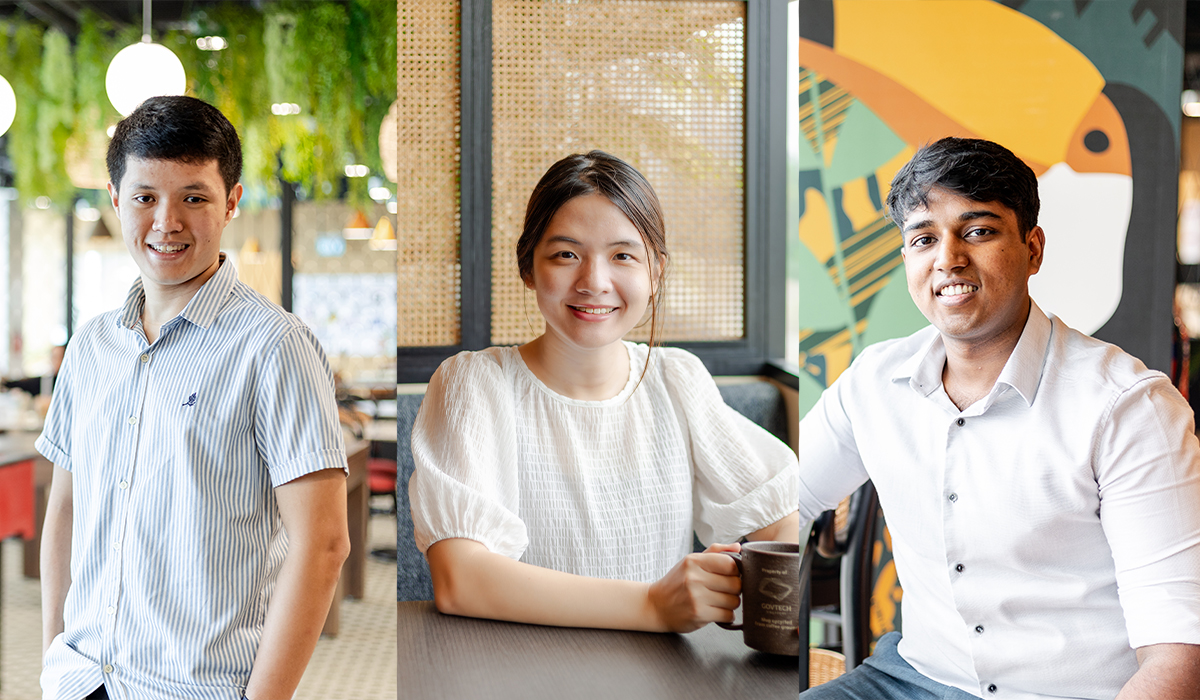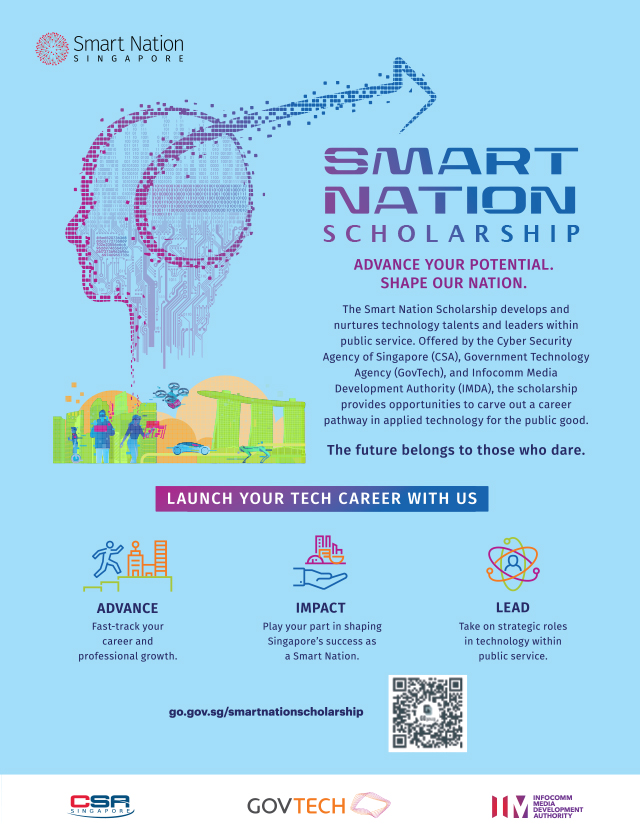Left: Oi Jun Jie is a recipient of the Smart Nation Scholarship and is pursuing a Bachelor of Science (Computer Science) at SMU. He is set to join the Cyber Security Agency of Singapore.
Middle: Choy Yi Jing is a Data Scientist at the Government Technology Agency. She was the recipient of the Smart Nation Scholarship and has obtained a Bachelor of Science (Information Systems) from SMU.
Right: Stalin Muthukumar Bill Kirankumar is a recipient of the Smart Nation Scholarship. He is in his second year at NUS, pursuing a Computing in Computer Science with a minor in Management and is set to join the Infocomm Media Development Authority upon graduation.
In Singapore, technology permeates nearly every aspect of our lives, shaping communication, healthcare, education, and business. It has become a catalyst for innovation and economic growth in Singapore, paving the way for a wide array of careers in tech.
The Smart Nation Scholarship (SNS), a government scholarship jointly offered by the Cyber Security Agency of Singapore (CSA), Government Technology Agency (GovTech), and Infocomm Media Development Authority (IMDA), plays a vital role in nurturing the brightest emerging tech talents in the country. SNS recipients undergo internships, rigorous training and more to set them up for success in their journey towards a smart and technologically empowered future.
SNS Scholars Jun Jie, Yi Jing, and Bill are enthusiastic about carving their places in this dynamic field while aspiring to create transformative digital solutions and make an impact as future tech leaders.
Jun Jie is poised to join CSA upon completing his Bachelor of Science (Computer Science) in SMU. He hopes to contribute his expertise to help build a more secure and digitally-resilient smart nation as a cybersecurity professional. Meanwhile, Yi Jing is a Data Scientist at GovTech, where she is working on a tool that will reduce the workload of educators through collaborative use of Generative AI technologies. She holds a Bachelor of Science (Information Systems) from SMU. Bill is a second-year NUS student, pursuing a Bachelor of Computing in Computer Science with a minor in Management. He is set to put his talents to use at IMDA working on impactful policies to keep pace with technological developments as well as evolving social norms and values, upon graduation.
We spoke to all three scholars to learn about their respective career paths and ambitions for a smarter Singapore.
Jun Jie, what sparked your interest in computer science?
I have always been intrigued by computers. My first foray into the world of computing was when I jailbroke an old phone to install cool widgets at the age of 14. This piqued my curiosity about backend software vulnerabilities, and I continued to explore the world of computing over the years. With my passion continuing to burn bright well into my teens, I decided to pursue a Diploma in Digital Forensics with Temasek Polytechnic. As part of the programme, I had the opportunity to intern with Klynveld Peat Marwick Goerdeler (KPMG) Singapore, which further widened my horizons on matters of cybersecurity. After graduating with a diploma, I realised that my passion for the industry had only grown and hence, I decided to continue my studies in the same realm.
Tell us what being a Smart Nation Scholar with GovTech means to you, Yi Jing.
At the time of my application, I was looking to further my studies after a two-year stint as a User Interface and User Experience (UIUX) designer. I’ve always known that I wanted to be able to work on projects that deliver meaningful impact to a wider target audience, and being part of GovTech would give me the opportunity to do just that.
As a Smart Nation Scholar, I can be at the forefront of digital transformation within the Singapore government to improve the services we render to citizens.
That’s commendable! Bill, what motivated you to apply for the scholarship?
It clicked for me during the COVID-19 pandemic. I witnessed various digitalisation initiatives in action, such as IMDA’s Hawkers Go Digital programme, created to drive the adoption of digital payments. I found that technology played a crucial role in helping us navigate through the crisis. I became increasingly curious and interested in the intersection between policy and technology, which led me to consider a career in this area.
When I came across the Smart Nation Scholarship application and learnt more about the different initiatives and policies introduced by IMDA, it became clear to me that IMDA was the place I aspired to be.
How has the scholarship been able to support you on your respective academic journeys?
Jun Jie: The scholarship I received has been instrumental in my exploration of the cybersecurity industry, aiding me in identifying areas where I can make significant contributions. Upon completing my internship at CSA this year, I aspire to actively participate in shaping cybersecurity policies that can profoundly impact our nation’s security within cyberspace.
Beyond my internship experience and the myriad of networking opportunities provided, CSA has been very supportive in allowing me to explore my interest in leveraging technology for public good. For instance, I was able to receive support from CSA to pursue a Community Service Project to develop an AI-powered Chatbot for migrant workers in Singapore. This initiative has taught me that technology is more than mere code; it’s a catalyst for positive change, capable of enhancing the lives of those who use them.
Yi Jing: The scholarship exposed me to the ongoing projects at GovTech, allowing me to understand what technological initiatives were ongoing while I was studying. This helped me supplement the theoretical knowledge I had with practical use cases.
Bill: Through the scholarship and the opportunities at IMDA, I was able to gain regulatory and industry exposure through interactions with various stakeholders. This exposure has allowed me to appreciate the concepts learnt during my university days being translated in my current work.
For instance, as part of a Digital Ethics and Data Privacy module, I had to read up on the Personal Data Protection Act (PDPA). This was useful for me as I had to apply what I learnt in school to real-life projects. Specifically, I worked on an industry guide about Data Protection technologies during my internship with IMDA. As part of my work, I was required to do policy interpretation of the PDPA, which required me to think about the complications faced by the industry when trying to adhere to regulations. It was eye-opening to revisit the concepts in school, albeit from a real-life perspective.
What has been the most significant achievement of your university experience?
Jun Jie: It would be the AI-powered ChatBot that I worked on for migrant workers in Singapore. The project’s aim was to bridge the language gap when communicating with migrant workers. However, it later became a research paper written in collaboration with the University of Toronto on the usage of digital technology to improve the well-being of migrant workers. What made this opportunity special was the opportunity to represent the team at an international summit abroad.
Bill: My time with the NUS Computing Technopreneurship Society has been meaningful to me. During my time there, I had the chance to network with various people involved in the startup space. I also had the opportunity to lead the organising committee for their flagship hackathon, BitHacks, earlier this year. It was a special experience for me as I worked towards providing a platform for my fellow schoolmates to pitch their entrepreneurial ideas while learning how to manage a sizeable team with different roles. Subsequently, I joined the club’s Executive Committee (EXCO) this semester and presently oversee the projects organised by the club. I also get to mentor the organising committee for our next BitHacks hackathon!
Impressive! Yi Jing, tell us what a day in the life of a data scientist at GovTech entails.
My typical workday involves meeting with the engineers, designers, and product managers to discuss and remove any obstacles that are hindering the development of my product. I also consult with the senior data scientists in my team to get advice regarding new data science features that I am planning to develop. Outside of my day-to-day work on my product, I’m also part of the Data Science and Artificial Intelligence Division’s (DSAID) welfare committee! We plan quarterly events for the division to get together, make friends, have some fun at work, and keep updated on what everyone in the division is up to!
Jun Jie, can you tell us what excites you most about getting to work with CSA?
I am very excited to contribute my skills and future expertise to help build a more secure and digitally resilient smart nation. CSA is a great place to do so since it is at the forefront of driving our national cybersecurity strategy. I look forward to the varied experiences gained that will shape me to be a better cybersecurity professional.
I would like to be able to work with others with the relevant skill sets in Artificial Intelligence and Machine Learning to build a smarter scam detection and malware detection system, that would be easily usable by the general public. I envision this system to be able to reduce the prevalence of malware scams.
Yi Jing, you’ve been developing products that use generative AI (LLMs). Could you elaborate on that?
As a Data Scientist with the Strategy & Transformation Team in DSAID, I’m working on prototypes and tools that use generative AI technologies. We try to see how generative AI can come in at different parts of the work process, to see if it could help reduce any manual and repetitive work or help generate new insights that would have otherwise been tedious to obtain.
We have received good feedback for the products that we have prototyped and developed and knowing that my work makes a real difference to our users has been incredibly satisfying to me.
Finally, Bill, what impact do you want to create through your upcoming career with IMDA?
As a regulator and developer of Singapore’s infocomm and media sector, IMDA creates a dynamic and holistic ecosystem with growth opportunities through policies, regulations and initiatives for businesses and the society.
In my opinion, the effectiveness of new technology boils down to two main aspects- the technology’s capabilities and how it is received by its intended audience. As much as we strive to push the boundaries of technology, it must stay relevant and intuitive enough for society’s use. Therefore, I aspire to contribute by working on technology development, implementing regulations, and spearheading initiatives to facilitate technological adoption by our local businesses.



